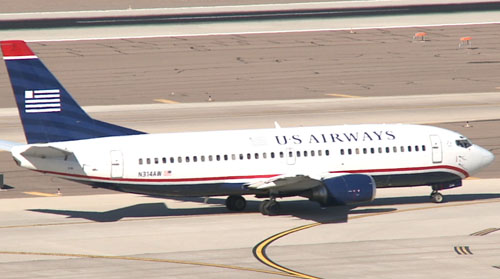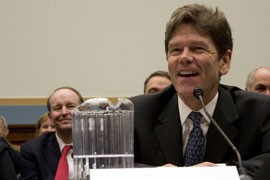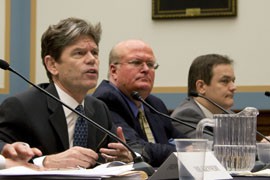Cronkite News has moved to a new home at cronkitenews.azpbs.org. Use this site to search archives from 2011 to May 2015. You can search the new site for current stories.
US Airways official repeats assurances about Phoenix jobs in merger
WASHINGTON – A US Airways executive repeated assurances in Washington on Tuesday that the company plans to maintain a significant corporate presence in Phoenix after its proposed merger with Texas-based American Airlines.
“We anticipate the Phoenix hub will remain a really vital and important part of the new American Airlines,” said Stephen Johnson, an executive vice president of US Airways, after a House subcommittee hearing on the impact of the proposed merger.
Johnson said some jobs at the current US Airways headquarters in Tempe will move to Texas, but the company will still employ about 9,000 people in Arizona after the merger.
The $11 billion deal, announced Feb. 14, would create the largest U.S. airline if allowed to proceed. It still needs to be approved by the court overseeing American Airlines’ bankruptcy, which is scheduled for March 27, and reviewed by the Department of Justice and the European Union to make sure it does not violate antitrust laws.
Some members of the House Judiciary Subcommittee on Regulatory Reform, Commercial and Antitrust Law questioned whether or not the proposed merger would maintain services and competitive fares.
In the last five years, Delta and Northwest merged, as did United and Continental. A few committee members noted that if the merger of US Airways and American Airlines is approved, four major airlines would control up to 86 percent of the market.
“I fear the public will see few benefits,” said Rep. John Conyers, D-Mich.
Rep. Steve Cohen, D-Tenn., said that during a similar hearing into the Delta-Northwest merger, he was promised that flights would be maintained in his Memphis district, even though the airlines would no longer be competing. But flights out of Memphis have been cut by 60 percent since then, he said.
Christopher Sagers, a Cleveland State University law professor and antitrust expert, testified that airline mergers historically lead to job losses, the closing of small hubs, higher fares and limited service.
Even though they raised some concerns about the merger, however, most members of the subcommittee seemed to take the deal for granted.
Sagers said he was surprised to hear both Democratic and Republican members of the committee asking the executives of the two airlines to consider their towns as new hubs.
“It felt to me as if the members are mostly concerned about ensuring their districts benefit from the merger and not about enforcing the laws against the merger that I think is probably going to hurt a lot of people,” Sagers said.
But executives from American and US Airways argued the new company would be able to better serve the public by connecting 192 airports previously served separately.
Gary Kennedy, a senior vice president for American Airlines, testified that the merger would also let the company offer employees better pay and benefits. Unions representing American Airlines’ flight attendants and pilots submitted statements to the committee supporting the merger.
Association of Professional Flight Attendants President Laura Glading said in her statement that the union supports the merger because it is “the only plan that allows American to compete and succeed.”
The executives insisted competition within the airline industry is intense and would be prevalent after the merger.
“This is the most competitive business, I think, on the planet,” Kennedy said.










